Ansco
Ansco was the brand name of a photographic company based in Binghamton, New York, which produced photographic films, papers and cameras from the mid-19th century until the 1980s.[1][2] In the Late 1880s ANSCO's predecessor, Anthony and Scovill, bought the Goodwin Camera & Film Company. Hannibal Goodwin invented the flexible photographic film, which should have made Anthony Scovill the leader in the amateur photography business. But George Eastman copied the patented process and immediately set out to compete against Anthony Scovill. The ruthless behavior of Eastman nearly drove the now named ANSCO out of business, but a settlement in 1905 saved the company from bankruptcy. Eastman Kodak got away cheaply on this legal proceeding. In 1928 AGFA merged with ANSCO to allow it to compete in the worldwide photographic market like its competitors, Kodak and Zeiss. This joint company added many AGFA cameras and accessories to its sales in the USA as a result. In the months after the bombing of Pearl Harbor, the US Government seized AGFA-ANSCO. This now government-run business continued to survive as a hostile alien property (under government control into the 1960s). During this period, the organization was renamed GAF (General Aniline & Film Corporation). Throughout the postwar period the concern sold rebadged versions of cameras made by other manufacturers, including Agfa and Chinon. A Minolta-built Ansco model was the first 35 mm camera in space and their film was used in space, too.
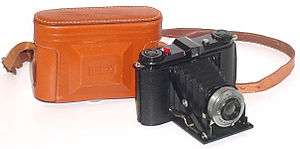

History
Early history
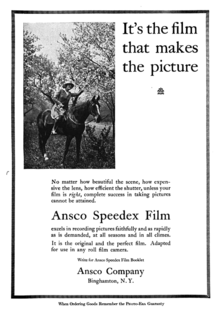
The company was founded in 1842 (pre-dating Kodak in the photography business) as E. Anthony & Co. (later E. and H. T. Anthony & Company, when Edward Anthony's brother officially joined the business) and became the Anthony & Scovill Co. in 1901, after a merger with the camera business of Scovill Manufacturing (Connecticut), founded by James Mitchell Lamson Scovill and William Henry Scovill. That year the company headquarters relocated to Binghamton, New York. This was already a site of one of Ansco's photographic paper manufacturing facilities. Just after that, in 1905 it settled a landmark patent infringement case against Eastman Kodak, which had been violating the Goodwin flexible film patent (Hannibal Goodwin of Newark, New Jersey) held by Ansco. The settlement received from Eastman Kodak was very small compared to the damage done to Ansco, which already had financial problems as a result of business lost to Eastman Kodak.[3]

Merger with Agfa
In 1928 Ansco merged with the German photo company Agfa to form a corporation named Agfa-Ansco. Later that year that firm and other German-owned chemical firms were merged into a Swiss holding company, Internationale Gesellschaft für Chemische Unternehmungen AG or IG Chemie, that was controlled by Germany's chemical industry conglomerate, IG Farben. In 1929 the parent corporation's name was changed to American IG Chemical Corporation or American IG, later renamed General Aniline & Film, which continued to produce cameras under the Agfa-Ansco name.[3]
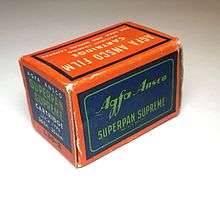
During the period before the U. S. entrance into World War II, the Agfa-Ansco business grew enormously, with added manufacturing capacity in paper, film and camera manufacturing. The Agfa-Ansco interests in the U. S. and Binghamton factory were taken over by the U. S. government in 1941 due to its ties with Germany.[3] The Ansco company was merged with General Aniline as General Aniline & Film in 1939.
Color film: Anscochrome
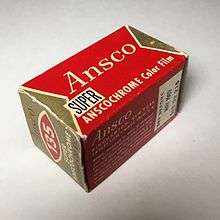
Prior to the war, Agfa-Ansco had marketed Agfacolor film made in Germany. To assist the war effort, the company experts used available information to develop a similar product, first called Ansco Color, later Anscochrome. After the war, Anscochrome was widely distributed, but met with limited commercial success in competition with Kodak products. An important marketing feature was its greater speed in comparison to Kodachrome.[4][5] A second advantage was that users, professional or amateur, could process the film in their own darkrooms rather than having to send it away (as with Kodachrome) or use cumbersome re-exposure steps as with Kodak Ektachrome.
Post-war business
The company was the last business to be sold as enemy assets to American interests in the 1960s. At that time, a new headquarters was constructed in Vestal, New York, adjacent to the new college campus of Harpur College (now Binghamton University). This location the one of two remaining pieces of Ansco in the Binghamton area and is currently occupied by the University. The second production building is located at 16 Emma Street and is currently luxury apartments. The Vestal location continued to do business after World War II as Ansco until 1967 when the company adopted the parent's name of General Aniline & Film (GAF), and a variety of cameras as well as films were sold under this name until the business was shut down in the early 1980s. Briefly in the 1970s, it was the official film of Disneyland and at this time, actor Henry Fonda served as the company's spokesman in television commercials including one that featured Jodie Foster in her first acting role.[6] The last Ansco cameras were produced in the early 1990s by a Hong Kong business that bought the rights to the name.[3]
Gallery
 Advertisement for Ansco cameras, 1922.
Advertisement for Ansco cameras, 1922.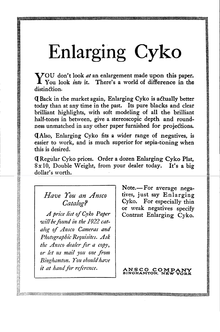 Advertisement for Cyko photographic paper, 1922.
Advertisement for Cyko photographic paper, 1922. Anscoflex II, pseudo-twin lens reflex.
Anscoflex II, pseudo-twin lens reflex. Advertisement for new higher speed Anscochrome film 1955.
Advertisement for new higher speed Anscochrome film 1955.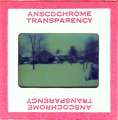 Anscochrome 35mm slide, 1960, as it appeared after 50 years in storage.
Anscochrome 35mm slide, 1960, as it appeared after 50 years in storage.
External links
| Wikimedia Commons has media related to Ansco. |
- Ansco chronology
- Full list of Ansco cameras
- TV commercials (mid-1950s)
- Clippings about Ansco in the 20th Century Press Archives of the ZBW
- "Ansco Camera Listing". Historic Camera. Archived from the original on May 2, 2019. Retrieved June 22, 2020.
- "Ansco Company History". Historic Camera. Archived from the original on April 22, 2016. Retrieved June 22, 2020.
References
- Current,Ira. ANSCO Reminiscences Broome County Historical Society Newsletter, Spring 1995.
- Ollinger, James. A Brief History of Agfa, Ansco and GAF Cameras.
- Camp, William L. "Ansco Chronology, From a Binghamton, N. Y. point of view.". Archived from the original on July 13, 2012. Retrieved July 14, 2011.
- Anscochrome and Ansco color transparencies slides. Archived February 13, 2013, at the Wayback Machine June 11, 2010.
- About Ansco. February 7, 2008.
- 1971 GAF View Master Commercial with Henry Fonda & Jodie Foster at YouTube